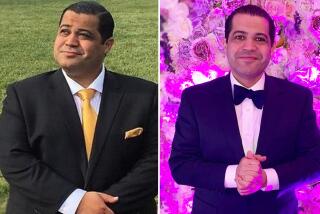Pincay’s Bad Habit : Diet Pills Put Him on Road to Weight Loss, and Addiction
- Share via
Laffit Pincay’s addiction to the amphetamine found in diet pills started innocently, and quite legally, after he moved to the United States from Panama in 1966.
“At the beginning, I used to eat very little,” said Pincay, referring to the first two years of his career, spent at Panama’s Remon track. “I tried to stay away from meat, I tried to stay away from protein and ate very little rice. Whatever I did was very little, and I used to jog and sweat in rubber suits and things like that.
“Then I came to this country, and I started to gain weight because I had to work hard at (riding), working more horses in the morning and riding horses every day. I started building more muscle.
“So then, I started taking diet pills. (It was) about ‘67--’66 or ’67. And there was a time when I was eating very little, taking diet pills and taking water pills. I never took more than one, but I took them all the time.”
The psychological effects of the amphetamines led the young Pincay to alcohol.
“I was very depressed, and I think that’s why a lot of riders start drinking a lot,” he said. “It’s like the only way to come out of it is if you have a drink, and once you have a drink, it makes all the difference in the world. You feel better. You feel relaxed. You feel like more control.
“It (also) puts more weight on you, and then the next day, you have to do it all over again. You take more diet pills, and you have to go in the sweat box again, and that’s why I think a lot of riders get a lot of speeding tickets, ‘cause they’re taking all this speed, and they can’t relax and they go too fast.”
Pincay nodded, his startling green eyes darkly serious. “I used to get a lot of speeding tickets, yes.”
And he used to get into a lot of arguments with his late wife. That, he said, is what finally prompted him to go cold turkey in 1976.
“I couldn’t go home. I wanted to go out and drink,” Pincay said. “And I was losing my wife, and I say, ‘Hey, what I want to be? A drinker? Or do I want to have a family?’ ”
The withdrawal process was long and excruciatingly painful--physically and mentally, he said.
“When I quit, I thought I was going to die, because the last pill I was taking was a pill called BiPhetamine, which is a narcotic,” Pincay recalled. “ . . . This doctor put me on a bad diet too, taking some other water pills, but no diet pills, and I thought I was going to die. But I made up my mind, I never was going to take it, and I never did again.”
From the diet pills, Pincay progressed to a high-protein diet accompanied by doctor-prescribed diuretics and from that to a health-food regimen consisting mostly of bran, nuts and berries. He also tried flipping, which he said made him feel guilty.
Finally, Pincay settled into a low-calorie but balanced and nourishing diet.
“I try to eat two ounces of protein in the morning,” he said. “I eat fish--I don’t eat red meat--I eat fish and chicken. Then I wait about two hours, and then I have maybe an ounce of rice with an ounce of beans, or, if I can afford it, two ounces and two ounces, but that’s very seldom.
“About three in the afternoon, I have an ounce of fish again. Then at nighttime I eat more.
“If I go to a regular place, whatever they give me, I eat. If I’m in the house, I cook about six ounces of fish or chicken and a lot of vegetables. I don’t weigh the vegetables, but the meat I do weigh.”
He also walks an hour a day.
More to Read
Sign up for Essential California
The most important California stories and recommendations in your inbox every morning.
You may occasionally receive promotional content from the Los Angeles Times.










